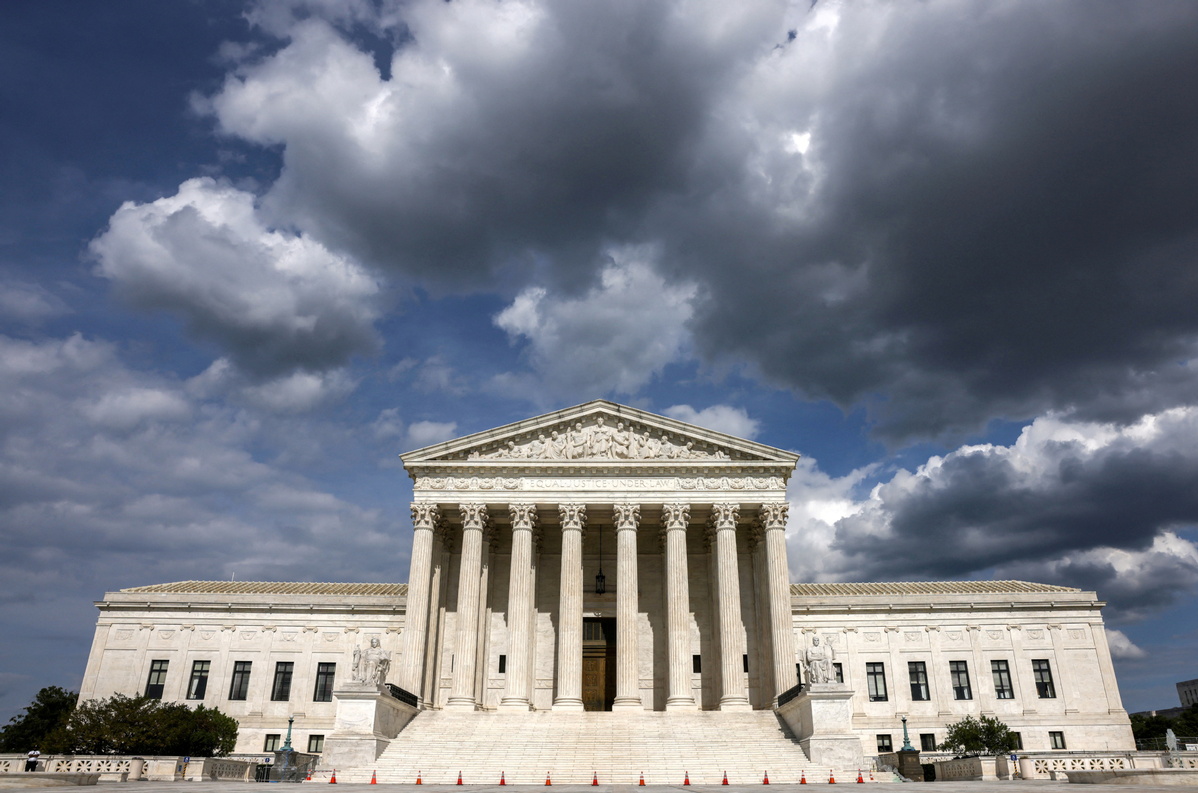Supreme Court blocks Biden's vaccine rules for large companies
By AI HEPING in New York | China Daily Global | Updated: 2022-01-14 05:07

The Supreme Court on Thursday struck down a Biden administration vaccine-or-testing mandate for large private employers that would have applied to more than 84 million workers but let stand a vaccine mandate for more than 10 million healthcare workers at facilities that receive federal funds.
The 6-3 vote on the employer mandate came as coronavirus cases reached a new high of 1.4 million early this week and have strained hospitals across the country, mainly with unvaccinated patients. The administration estimated that the mandate would cause 22 million people to get vaccinated and prevent 250,000 hospitalizations.
President Joe Biden issued a statement praising the ruling on healthcare workers but criticized the ruling on businesses that will have a much wider effect.
Biden said "it is now up to states and individual employers to determine whether to make their workplaces as safe as possible for employees, and whether their businesses will be safe for consumers during this pandemic by requiring employees to take the simple and effective step of getting vaccinated".
The Labor Department's Occupational Safety and Health Administration (OSHA) had issued the employer mandate in November. Parts of it had been scheduled to take effect on Monday. It would have required all businesses with 100 or more workers to either be vaccinated, with the federal government footing the bill, or be tested weekly. There were exceptions for workers with religious objections and those who don't come into close contact with other people at their jobs, like those who work from home or exclusively outdoors.
Dr Scott Gottlieb, former commissioner of the Food and Drug Administration, tweeted of the OSHA mandate: "Notwithstanding ruling, bottom line is OSHA was doing little to enforce it, and that was unlikely to change. Biden Admin realized how divisive and clunky this became. It was always a bridge too far, more likely to harden opposition to vaccination efforts than ease these divides."
The Supreme Court has repeatedly upheld state vaccine mandates against constitutional challenges. But the court's ruling on Thursday primarily deals with the question of whether Congress has authorized the executive branch to institute the requirement.
The high court said that the OSHA rule was not an ordinary use of federal power. "It is instead a significant encroachment on the lives — and health — of a vast number of employees," the court said.
The court's majority downplayed the risk that COVID-19 specifically poses in the workplace, comparing it instead to "day-to-day" crime and pollution hazards individuals face everywhere.
"Permitting OSHA to regulate the hazards of daily life — simply because most Americans have jobs and face those same risks while on the clock — would significantly expand OSHA's regulatory authority without clear congressional authorization," the court said.
The three dissenting justices wrote, "If OSHA's standard is far-reaching — applying to many millions of American workers—it no more than reflects the scope of the crisis.'' The virus spreads most easily "in the shared indoor spaces that are the hallmark of American working life. The proof is all around us: Since the disease's onset, most Americans have seen their workplaces transformed."
The dissenters also called it "perverse" to prevent OSHA from addressing workplace hazards simply because the danger also exists off the job.
The mandate for healthcare workers applies to those at hospitals and other healthcare facilities that participate in the Medicare and Medicaid programs. It would affect more than 17 million workers, the administration said, and would "save hundreds or even thousands of lives each month".
The court by a vote of 5-4 said that the vaccine mandate was, unlike the OSHA regulation, justified by the spending clause of the Constitution, which allows the federal government to impose conditions when it provides funding for programs like Medicaid and Medicare. In addition, the court said, the regulation served to protect patients from being exposed to greater risks when they are in a hospital, nursing home or being cared for by other health entities.
"The rule thus fits neatly within the language of the statute. After all, ensuring that providers take steps to avoid transmitting a dangerous virus to their patients is consistent with the fundamental principle of the medical profession: first, do no harm," they wrote in the unsigned opinion. "It would be the 'very opposite of efficient and effective administration for a facility that is supposed to make people well to make them sick with COVID-19.'"
That mandate, which doesn't include a testing alternative, was issued by the Centers for Medicare and Medicaid Services, which said facilities that accept money from those programs must comply. Because of conflicting lower court rulings, that mandate had been in effect in only half of the states.
The court said the secretary of Health and Human Services held broad authority to ensure that the healthcare providers who care for Medicare and Medicaid patients protect their patients' health and safety.
"COVID–19 is a highly contagious, dangerous, and — especially for Medicare and Medicaid patients — deadly disease," the majority wrote, noting that healthcare workers and public health organizations overwhelmingly supported the mandate.
"Indeed, their support suggests that a vaccination requirement under these circumstances is a straightforward and predictable example of the health and safety regulations that Congress has authorized the secretary to impose," the court said.
The Associated Press and Reuters contributed to this story.
























